人教版九年级下册 Unit 10 You are suppoed to shake hands. Section B 2a-3b 课件(共69张PPT)
文档属性
| 名称 | 人教版九年级下册 Unit 10 You are suppoed to shake hands. Section B 2a-3b 课件(共69张PPT) | 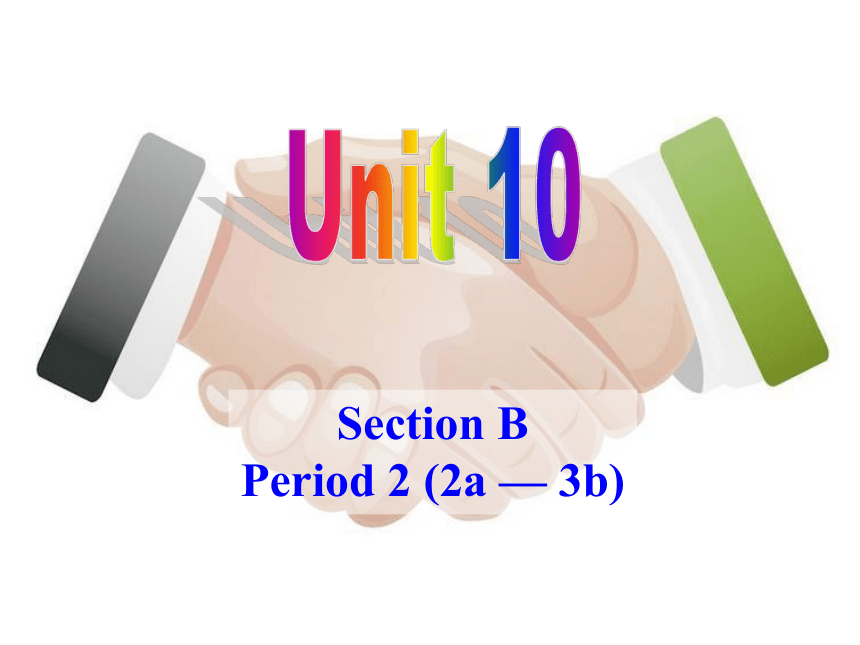 | |
| 格式 | ppt | ||
| 文件大小 | 1.8MB | ||
| 资源类型 | 教案 | ||
| 版本资源 | 人教新目标(Go for it)版 | ||
| 科目 | 英语 | ||
| 更新时间 | 2023-03-16 16:02:30 | ||
图片预览


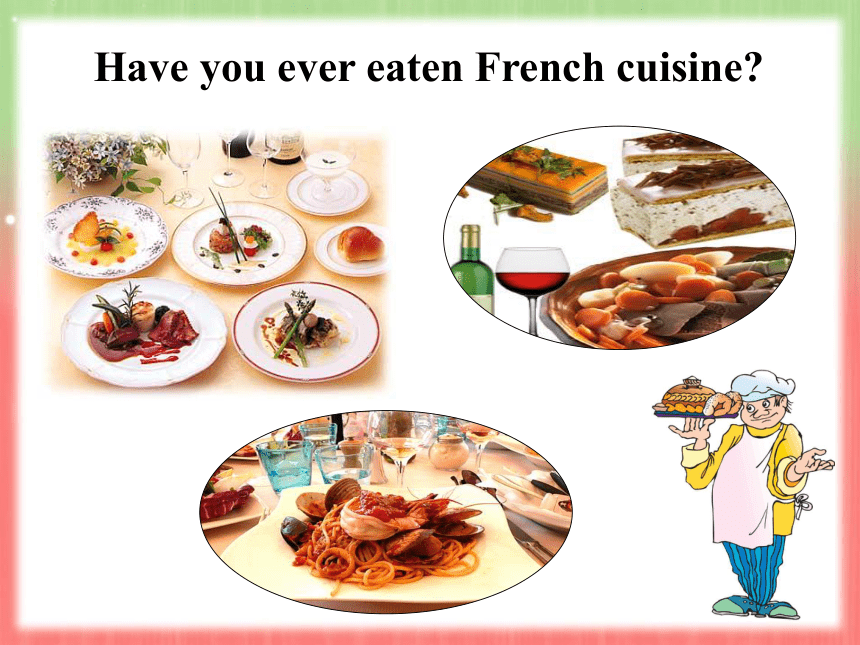
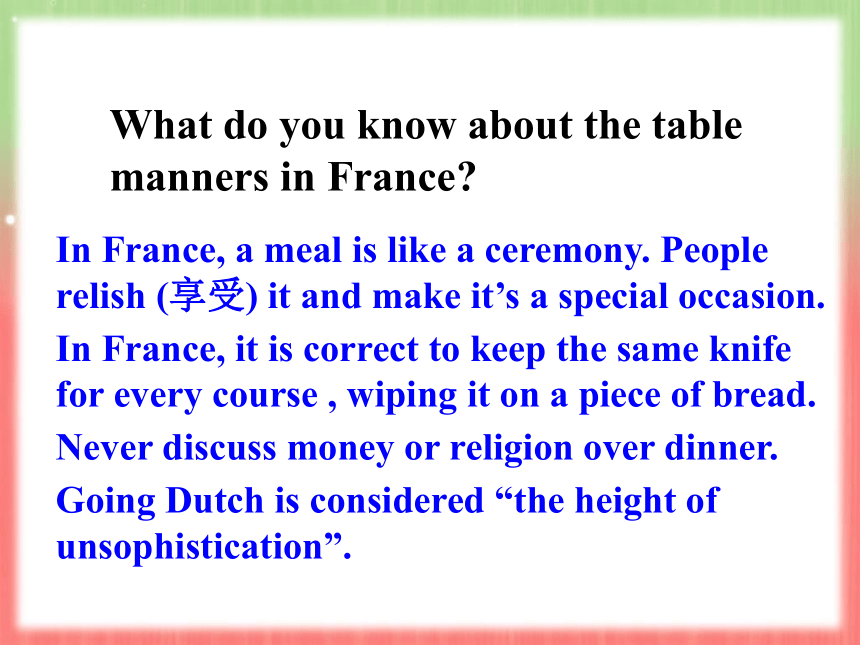
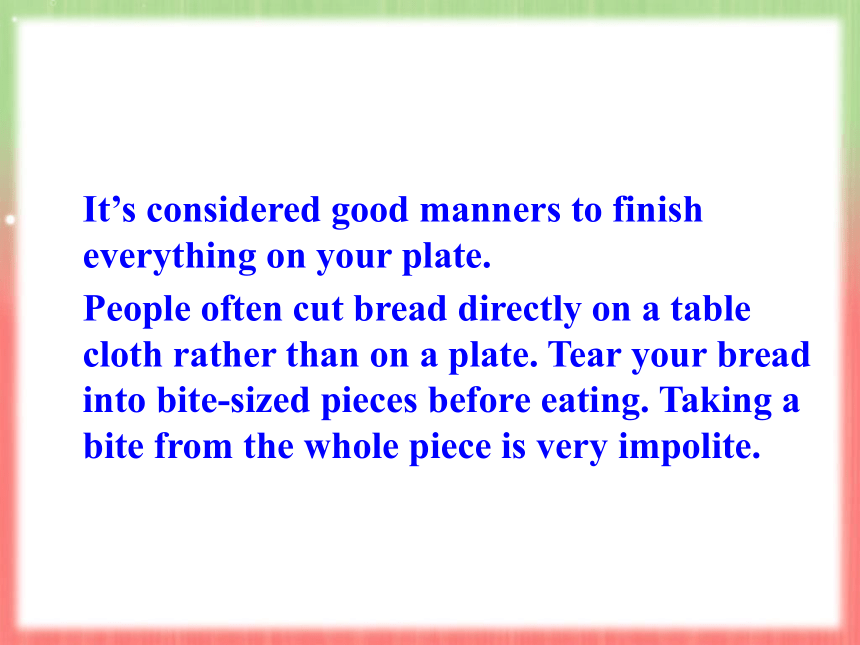
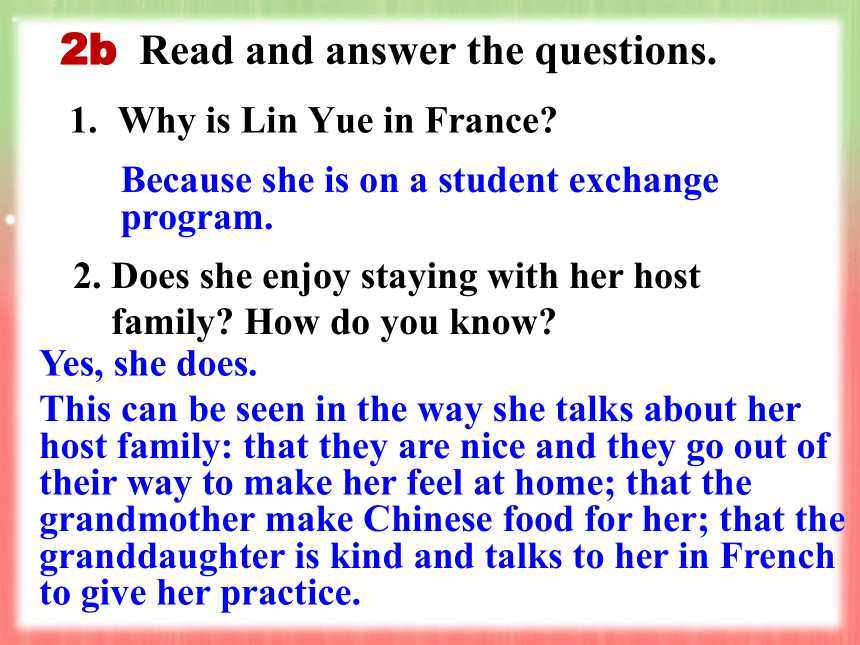
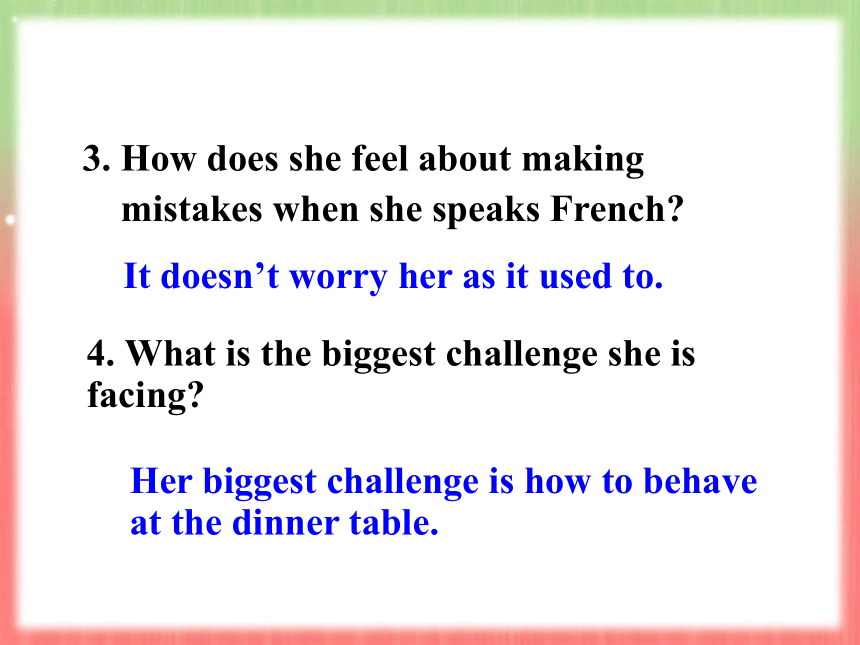
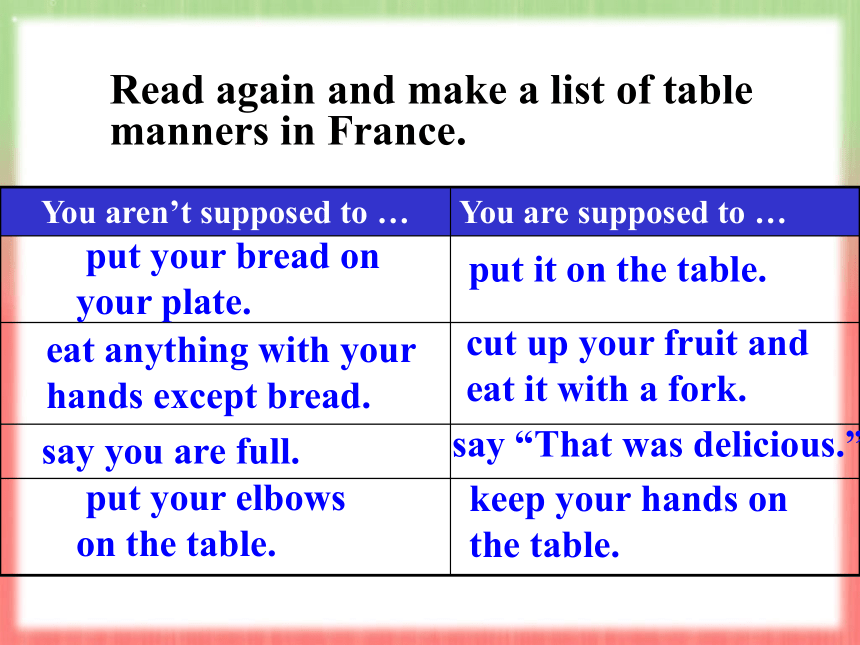
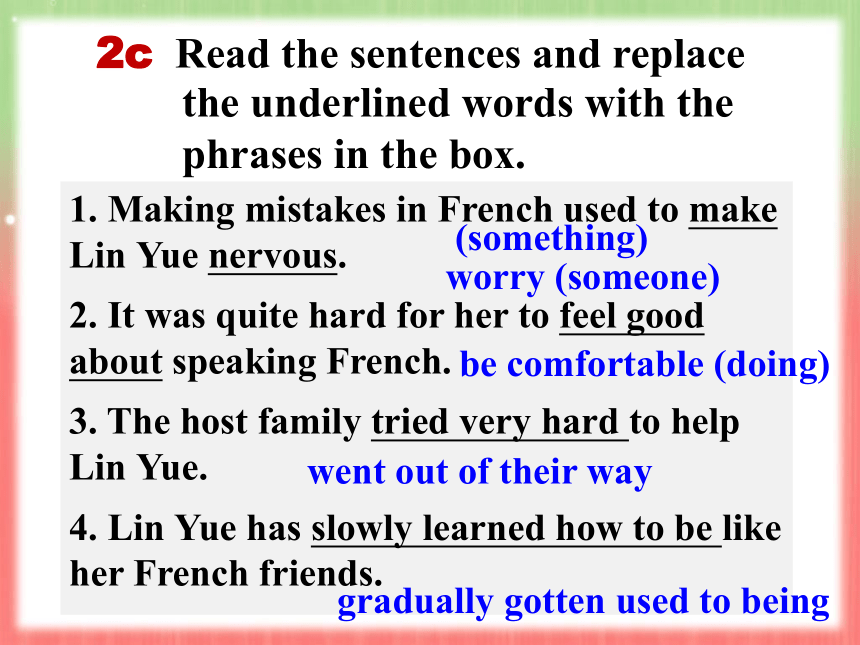
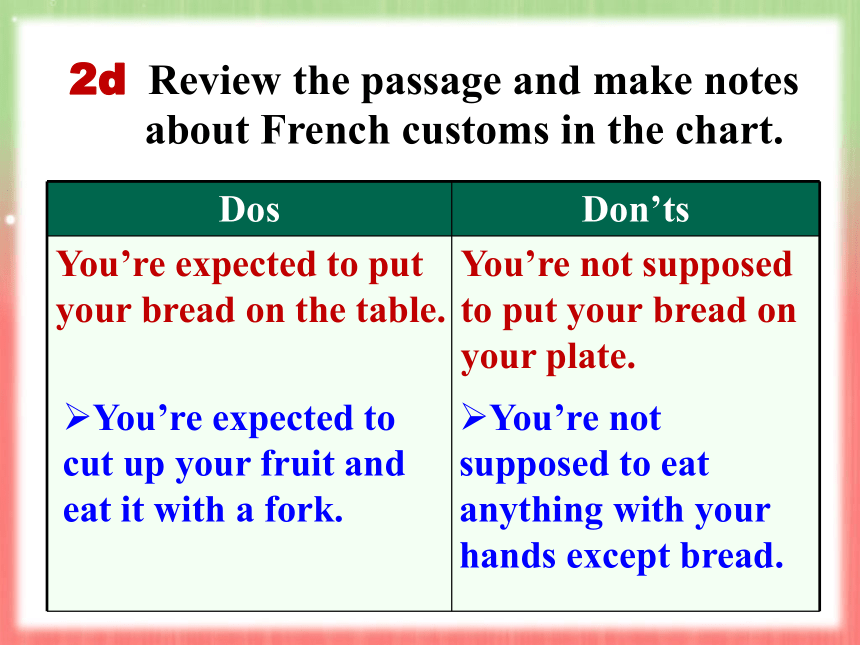
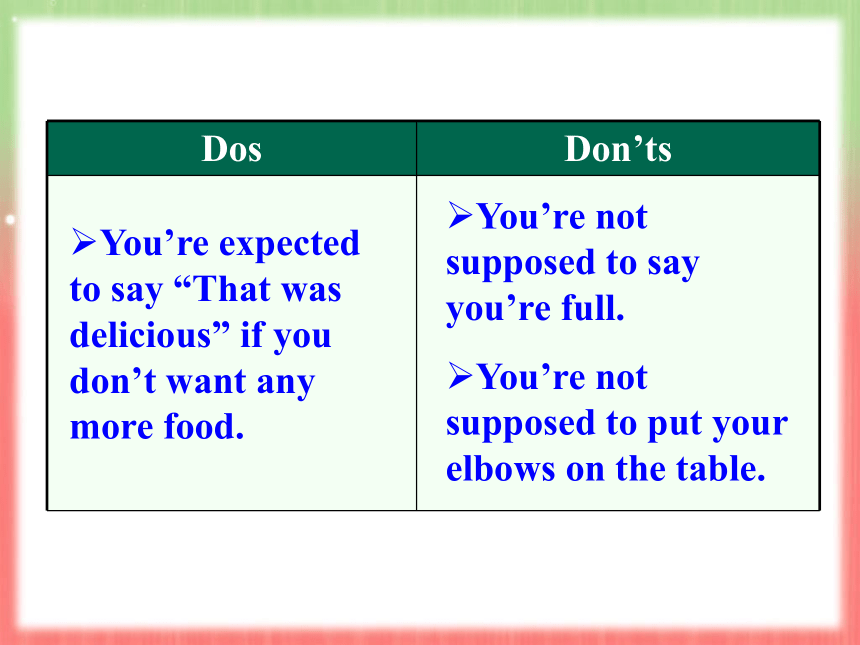

文档简介
(共69张PPT)
Section B
Period 2 (2a — 3b)
Do you know these places in France
Have you ever eaten French cuisine
What do you know about the table manners in France
In France, a meal is like a ceremony. People relish (享受) it and make it’s a special occasion.
In France, it is correct to keep the same knife for every course , wiping it on a piece of bread.
Never discuss money or religion over dinner.
Going Dutch is considered “the height of unsophistication”.
It’s considered good manners to finish everything on your plate.
People often cut bread directly on a table cloth rather than on a plate. Tear your bread into bite-sized pieces before eating. Taking a bite from the whole piece is very impolite.
Why is Lin Yue in France
Because she is on a student exchange program.
2. Does she enjoy staying with her host
family How do you know
Yes, she does.
This can be seen in the way she talks about her host family: that they are nice and they go out of their way to make her feel at home; that the grandmother make Chinese food for her; that the granddaughter is kind and talks to her in French to give her practice.
2b Read and answer the questions.
4. What is the biggest challenge she is facing
Her biggest challenge is how to behave at the dinner table.
3. How does she feel about making
mistakes when she speaks French
It doesn’t worry her as it used to.
Read again and make a list of table manners in France.
You aren’t supposed to … You are supposed to …
put your bread on your plate.
put it on the table.
eat anything with your hands except bread.
cut up your fruit and eat it with a fork.
say you are full.
say “That was delicious.”
put your elbows on the table.
keep your hands on the table.
2c Read the sentences and replace
the underlined words with the
phrases in the box.
1. Making mistakes in French used to make Lin Yue nervous.
2. It was quite hard for her to feel good about speaking French.
3. The host family tried very hard to help Lin Yue.
4. Lin Yue has slowly learned how to be like her French friends.
(something) worry (someone)
be comfortable (doing)
went out of their way
gradually gotten used to being
2d Review the passage and make notes
about French customs in the chart.
Dos Don’ts
You’re expected to put your bread on the table.
You’re not supposed to put your bread on your plate.
You’re expected to cut up your fruit and eat it with a fork.
You’re not supposed to eat anything with your hands except bread.
Dos Don’ts
You’re expected to say “That was delicious” if you don’t want any more food.
You’re not supposed to say you’re full.
You’re not supposed to put your elbows on the table.
Can you compare the table manners in France and in China
In France, people put their bread on the table.
But in China, we always put our food on a plate or in a bowl. We never put food on the table.
Do you know about the table manners in other countries
Japan
It is OK to make noise when you eat noodles. It shows that you like the food.
It’s important to say traditional phrases of thanks before and after a meal.
Eat sushi whole. Dip the fish part rather than the rice into soy sauce.
Russia
Keep your hands in sight. It is not good manners to rest them on your lap. Keep your elbows off the table.
Leave some food on your plate to show that the host has given you enough to eat. Or the host will ask if you’d like to have a second helping. It’s polite to mop up excess sauce or gravy with bread.
America
If you empty a bottle into someone’s glass, it obliges that person to buy the next bottle. It’s polite to put the last drops into your own glass.
Japan
Don’t fill your own glass of alcohol; instead, you should pour for others and wait for them to reciprocate.
Tell us whether you agree or not.
1. While eating meals with other people, it’s OK to talk. But you aren’t supposed to make too much noise.
2. While making appointments, it doesn’t matter if you arrive a little late. You are supposed to be relaxed about time.
3. While giving compliments, you’re supposed to think of proper words to praise and encourage people to do better.
4. While offering tea, you’re supposed to bow and use both of your hands.
5. While introduce other people, you are supposed to kiss without any words.
6. While speaking to older people, you should try to make your language more polite. Remember to be ready to help them out.
7. While making a toast at dinner, you are supposed to say something good to cheer them up.
3a Your pen pal is coming to China on an exchange program. He / She is asking you about Chinese customs and what he / she is supposed to do or not. Make notes in the chart.
3b Write a letter to your pen pal to give him / her advice and suggestions on how to behave properly in China.
Dear Ivan,
You must be excited about coming to China soon. Let me give you some suggestions and advice about Chinese customs. When you’re eating at the table, it’s impolite to start eating first if there are older people at the table. You should let them start first. When you are eating with chopsticks, it is impolite to point at other people with your chopsticks. It is also impolite to stick your chopsticks into the bowl of rice and leave them there.
Sample
In our house, you’re supposed to take off your shoes before you enter the house or just inside the front door. In our culture, we don’t usually hug or kiss people.
When you go out with people, you should tell the hostess where you are going, who you are going with and when you will come back. In our culture, the hostess will worry a lot about the safety of her guests, so a polite guest will always let her know these things.
Have a safe trip, and I look forward to meeting you soon!
Best wishes,
Xiao Wei
An exchange student from a foreign country is going to visit you. Please write a small article to tell him / her about things he / she is supposed to do.
You can use:
be supposed to do …
It’s polite / impolite to …
You should …
You’d better …
… is / are not allowed.
Sample
Tim, welcome to our school. Here is something I want to tell you. First, if you meet a teacher on your way to school, it’s polite to stop to bow and say “Good morning” to him / her. Second, our school has got out lots of activities to make you feel at home. You’d better make a plan with your friends and decide what to do because you are supposed to finish homework every day.
If you’d like to visit a Chinese family, being there on time is very important. At the last day, we’ll have a party with the host family. You’re not supposed to give gifts to them, but you should show your thanks.
We’re looking forward to meeting you in Beijing. I’m sure you’ll have a great time here.
假如你叫刘敏,你的笔友 Paul 要来中国学习一段时间, 在到中国之前, 他想了解中国的风俗习惯, 请你给他写封信,讲述一些中国的风俗习惯,告诉他不要紧张。 内容提示:可以从见面问好、餐桌礼仪等方面介绍。
Dear Paul,
How are you I am glad to know that you will
come to China. Chinese people are very friendly,
so you don’t have to be nervous.
In China, when you meet someone, you are
supposed to shake hands. It’s important for you
to know some table manners. You are supposed
to use chopsticks instead of spoon and fork. You
are supposed to pick up your bowl to eat.
It’s impolite to stick your chopsticks into your
food. You shouldn’t make noise while eating
noodles. People in China and America behave
differently at the dinner table. There are many
different table manners here. I will tell you
more when you come to China. I am looking
forward to seeing you in China.
Yours
Liu Min
Translate the phrases.
table manners
be supposed to do
at the dinner table
host family
face challenges
thanks for …
have a great time
student exchange program
餐桌礼仪
应当,应该
在餐桌上;吃饭时
寄宿家庭;主人家
面对挑战
感谢……
玩得很痛快
交换(留学)生计划
a bit nervous
go out of one’s way
make sb. at home
make Chinese food
a teenage granddaughter
about one’s age
talk to sb. in French
because of
be comfortable doing sth.
有些紧张
特地;格外努力;不怕麻烦地
使某人感到宾至如归
做中餐
一个十几岁的孙女
同某人的年龄差不多
用法语与某人谈话
因为 / 由于……
做某事很轻松,乐意做某事,做某事很自如
be different from
for example
eat sth. with hands
cut up
eat sth. with a fork
put one’s elbows on the table
get used to sth./ doing sth.
与……不同; 不同于
例如
用手吃……
切碎
用叉子吃……
把胳膊放在桌上
习惯于……
I was a bit nervous.
a little late
a bit 和a little作程度副词修饰形容词、副词、动词或比较级时,意义相同,为“一点儿,有些”。
He walked a bit / a little slowly.
他走路有点慢。
二者都可以作名词词组, 做主语或宾语。如:
A little / bit is enough for me.
我有一点儿就够了。
I know only a little / a bit about her.
我对她的情况只了解一点。
a little可直接修饰名词;而a bit后须加of才可以。如:
There is a little water in the bottle.
= There is a bit of water in the bottle.
否定形式 not a little 作状语,相当于very / quite, “很, 非常”;作定语和宾语时,相当于much, 意为 “许多”。而not a bit 作状语时,相当于not at all, 意为“一点也不”,作宾语时则相当于not much。如:
He is not a little (= very) hungry.
他饿极了。
He is not a bit (= not at all) hungry.
他一点也不饿。
用a bit或a little填空。
1. There is _________ time left.
2. I would like you to stay for _________ if you
have time.
3. This will give us a _________ of time.
4. He went to sleep soon, for he was not
_________ tired.
5. I don't want to stop to have a rest, because I
am not _________ tired.
a little
a bit / a little
a bit
a little
a bit
从A、B、C、D四个选项中,选出与所给句子划线部分意义相同或相近并能代替的那一项。
With a little training, she could do very well in the competition.
A. few B. a few
C. a bit D. a bit of
D
2. They go out of their way to make me feel at home.
go out of one’s way 特地;格外努力
She always goes out of her way to please her guests.
她总是不怕麻烦地使客人称心如意。
He would go out of his way to help anyone in trouble.
他愿意不怕麻烦去帮助任何有困难的人。
与way有关的短语
all the way 一路上 in no way 决不
by the way 顺便提一下,另外
in a way 在某点,在某种程度上
by way of 经由,通过 …… 方式
get in the way 挡道
in one's / the way 妨碍,阻碍
in this way 用这种方法
lead the way 带路,引路
lose one's way 迷路
on the / one's way (to) 在去……的路上
知识链接
3. about my age 同我的年龄差不多
Bernice is a girl about my age.
伯妮斯是个和我年纪接近的女孩。
He was just about my age.
他和我年龄相仿。
live to a great age
活到高龄
look one's age
和年龄相称
look young for one's age
看上去比实际上年轻
be under age
未达适龄年限
people of all ages
各种不同年龄的人
知识链接
4. I’m very comfortable speaking French now.
be comfortable doing sth. 做某事很轻松,做某事很自如,乐意做某事
I feel comfortable talking with you.
和你讲话我感觉很舒服。
be comfortable with 对……感到舒服
be comfortable about 满足于……
5. … how to behave at the dinner table.
behave v. 表现;举止
If you behave like that, you'll get yourself disliked.
如果你的行为那样,你会让人厌恶的。
It's hard to train children to behave well at the table.
培养儿童用餐时举止得体很困难。
He behaves himself like a man.
他表现得像一男子汉。
behavior n. 行为;举止;习性;态度
The underlined letter “a” in the word
“_______ ” has a different pronunciation
from the others.
A. math B. calendar
C. fantastic D. behave
D
你如果不注意你的行为举止,会惹麻烦的。(the way behave)
You will get into trouble if you pay no attention to the way you behave.
6. I thought that was pretty strange at first, ...
pretty在这里是用作副词,意思是“颇;相当地”。 pretty作副词, 常用于口语,可以修饰其他形容词或副词。
I am pretty sure that he'll say yes.
他会同意的,我对此相当有把握。
After six months, I could speak Chinese
pretty well.
6个月之后,我的汉语就能讲得相当好。
The documentary A Bite Of China II is quite popular around China recently. How do you like it
—______.
A. I think so B. Pretty good
C. It’s my pleasure D. All right
B
pretty adj. 漂亮的;秀丽的;好看的
What a pretty little garden!
多么漂亮的小花园!
She is not really beautiful, but she looks
pretty when she smiles.
她其实并不漂亮,但笑起来很好看。
pretty语气较beautiful弱, 且大多用来指年轻的女性, 一般不用来描写成年男性。pretty也可以用于男女儿童, 表示漂亮、活泼、可爱。
知识链接
7. … you’re not supposed to eat anything with your hands except bread …
except prep. 除……之外
No one trusts him except himself.
除了他自己,没有人相信他。
She rarely went anywhere except to her office.
她除了去办公室以外,很少去别的地方。
The overnight train runs every night of the week except Saturdays.
这趟夜班火车除了周六外每个晚上都运行。
except conj. 除非;除了 …... 之外;若不是
They didn't open their mouths except to
complain.
除了抱怨他们从不开口。
She remembered nothing about him
except that his hair was black.
她对他什么都不记得,只记得他的头发是黑的。
I like her except when she is angry.
我喜欢她,只要她不发脾气。
知识拓展
辨析except,except for,unless和besides
except侧重于排除在外,从整体里减去:
All of his body relaxed except his right hand.
除了右手外,他全身都放松了。
except for表示“除了……;只是……”,引述一个相反的原因或细节, 部分地修正了句中的意思:
The classrooms were silent, except for the scratching of pens on paper.
除了钢笔在纸上写字的声音,教室里一片安静。
知识链接
unless用来引出某事发生或成立所必需的条件:
You must not give compliments unless you mean them.
除非出自真心实意,否则不要随便恭维别人。
besides着重于指另外还有:
Besides knowing some Greek, she was fluent in Italian.
她除了懂些希腊语之外,意大利语也说得很流利。
We need fifteen more people _______ the
twenty of us to do the job.
A. besides B. and
C. except D. without
--- Did you study any other foreign language
______ English when you were at college --- Yes, I studied three. But I have forgotten
all ______ a few words of each.
A. besides; besides B. but; except
C. except; except D. besides; except
besides
D
All the workers went home yesterday ________ Mr. White. Why
— Because he was on duty.
A. except B. besides
C. except for D. beside
【解析】besides区别于except是前者的除外包含其本身,后者不包含。except for区别于except是前者前后事物是不同类的,后者是同类的。句意:--为什么除了怀特先生所有的工人昨天都回家?--因为他要值班。
A
Everyone else in my class was invited _____________ (除了) me, and I don’t know why.
根据句意和汉语提示写出单词,完成句子,每空一词。
After the whole day’s voluntary work, I felt fine __________ (除……之外) for being a little tired.
except
except
8. Another thing is that it’s impolite to say that you’re full.
full adj. 吃饱的; 满的, 充满的
You can't go swimming on a full stomach.
不能吃饱了饭去游泳。
He has a very full programme for his visit to London.
他访问伦敦的时间表排得满满的。
He has been away for a full year now.
他离开已整整一年了。
be full of, (be) filled with这两个短语的共同意思是“充满…”, 有时可以换用。其区别是,be full of指的是“充满的”这一状态, 而(be) filled with通常指动作。
The theatre is full of people.
剧场里人满满的。
The theatre is filled with people.
剧场里挤满了人。
知识链接
So songs were often _______
anger.
A. filled with B. short of
C. in need of
A: The basket is filled with flowers.
B: The basket is ____ ____ flowers.
A
full of
9. …, but I’m gradually getting used to it.
get used to = be used to,意思为“习惯于某事或做某事的意思”,to为介词,后接名词或动名词,不能跟动词原形。
We are used to the weather in the south of China.
我们习惯了中国南方的天气。
They have got used to getting up early in the morning.
他们已习惯早起。
be / get used to结构可以用于各种时态中。
You’ll be / get used to the work soon.
你不久就会习惯这个工作。
在学习be used to结构时,一定要注意它与以下几个结构的区别:
used to do sth.意为“过去常常”,在这里to是动词不定式符号;
be used to do sth.和be used for doing sth.意为“被用来做某事”,是被动结构。
知识链接
John used to smoke.
约翰过去抽烟。
This kind of wood can be used to make violins.
这种木头可以用来制作小提琴。
This computer ___________ control all the machines in the factory.
He _________ a teacher in our school, but he quitted his job last year.
The old man and his wife _______________ living a simple life already. They won’t move to the city.
The pan ___________ cooking.
used to do be used to do
be / get used to doing be used for doing
is used to
used to be
have got / been used to
is used for
28. Mary is used to ____ a
T-shirt and jeans.
A. wear B. put on
C. wearing D. putting on
【解析】词义辨析。句意“玛丽习惯于穿T恤衫和牛仔裤”,be used to doing sth.习惯于做某事,因此排除选项A、B,wear强调状态,put on强调动作,由句意知“此处表示状态”,因此选C。
根据句意完成句子, 每空一词。
1. 你不会相信我的法语进步得多快!
You wouldn’t believe ______ ______ my
French has improved!
2. 他们尽力让我感觉像在家里一样。
They ______ ______ ______ their way ______ ______ me ______ at home.
how quickly
go out of
to
make
feel
3. 虽然我仍然犯许多错误,但它不像以前那样困扰我了。
Although I still make lots of mistakes, it doesn’t worry me like it ______ ______.
4. 我觉得记住所有的规矩是很难的,但是我也渐渐习惯了这些,不再觉得它们奇怪了。
I find it difficult ______ ______ all rules, but I’m gradually ______ ______ ______ these and don’t find them so strange anymore.
used to
to remember
getting used to
把下列汉语翻译成英语。
1. 我们今天应该几点到学校?
______________________________________________
2. 我去博物馆时,顺便去了我同学家。
______________________________________________
______________________________________________
3. 我过去常常吃肉,但现在我习惯吃蔬菜。
______________________________________________
______________________________________________
When are we supposed to get to school today
I dropped by my classmate’s home when I went to the museum.
I used to eat meat, but now I am / get used to eating vegetables.
单项选择
1. I like gentle music that can make us ______ relaxed.
A. feels B. felt C. feel D. feeling
2. There are many trees on ______ side of the road.
A. both B. each C. every D. none
4. He ______ live with his friends, but he ______ living alone now.
A. used to; used to B. is used to; is used to
C. is used to; used to D. used to; is used to
5. All of us find ______ necessary to take exercise every day.
A. it B. them C. this D. that
Section B
Period 2 (2a — 3b)
Do you know these places in France
Have you ever eaten French cuisine
What do you know about the table manners in France
In France, a meal is like a ceremony. People relish (享受) it and make it’s a special occasion.
In France, it is correct to keep the same knife for every course , wiping it on a piece of bread.
Never discuss money or religion over dinner.
Going Dutch is considered “the height of unsophistication”.
It’s considered good manners to finish everything on your plate.
People often cut bread directly on a table cloth rather than on a plate. Tear your bread into bite-sized pieces before eating. Taking a bite from the whole piece is very impolite.
Why is Lin Yue in France
Because she is on a student exchange program.
2. Does she enjoy staying with her host
family How do you know
Yes, she does.
This can be seen in the way she talks about her host family: that they are nice and they go out of their way to make her feel at home; that the grandmother make Chinese food for her; that the granddaughter is kind and talks to her in French to give her practice.
2b Read and answer the questions.
4. What is the biggest challenge she is facing
Her biggest challenge is how to behave at the dinner table.
3. How does she feel about making
mistakes when she speaks French
It doesn’t worry her as it used to.
Read again and make a list of table manners in France.
You aren’t supposed to … You are supposed to …
put your bread on your plate.
put it on the table.
eat anything with your hands except bread.
cut up your fruit and eat it with a fork.
say you are full.
say “That was delicious.”
put your elbows on the table.
keep your hands on the table.
2c Read the sentences and replace
the underlined words with the
phrases in the box.
1. Making mistakes in French used to make Lin Yue nervous.
2. It was quite hard for her to feel good about speaking French.
3. The host family tried very hard to help Lin Yue.
4. Lin Yue has slowly learned how to be like her French friends.
(something) worry (someone)
be comfortable (doing)
went out of their way
gradually gotten used to being
2d Review the passage and make notes
about French customs in the chart.
Dos Don’ts
You’re expected to put your bread on the table.
You’re not supposed to put your bread on your plate.
You’re expected to cut up your fruit and eat it with a fork.
You’re not supposed to eat anything with your hands except bread.
Dos Don’ts
You’re expected to say “That was delicious” if you don’t want any more food.
You’re not supposed to say you’re full.
You’re not supposed to put your elbows on the table.
Can you compare the table manners in France and in China
In France, people put their bread on the table.
But in China, we always put our food on a plate or in a bowl. We never put food on the table.
Do you know about the table manners in other countries
Japan
It is OK to make noise when you eat noodles. It shows that you like the food.
It’s important to say traditional phrases of thanks before and after a meal.
Eat sushi whole. Dip the fish part rather than the rice into soy sauce.
Russia
Keep your hands in sight. It is not good manners to rest them on your lap. Keep your elbows off the table.
Leave some food on your plate to show that the host has given you enough to eat. Or the host will ask if you’d like to have a second helping. It’s polite to mop up excess sauce or gravy with bread.
America
If you empty a bottle into someone’s glass, it obliges that person to buy the next bottle. It’s polite to put the last drops into your own glass.
Japan
Don’t fill your own glass of alcohol; instead, you should pour for others and wait for them to reciprocate.
Tell us whether you agree or not.
1. While eating meals with other people, it’s OK to talk. But you aren’t supposed to make too much noise.
2. While making appointments, it doesn’t matter if you arrive a little late. You are supposed to be relaxed about time.
3. While giving compliments, you’re supposed to think of proper words to praise and encourage people to do better.
4. While offering tea, you’re supposed to bow and use both of your hands.
5. While introduce other people, you are supposed to kiss without any words.
6. While speaking to older people, you should try to make your language more polite. Remember to be ready to help them out.
7. While making a toast at dinner, you are supposed to say something good to cheer them up.
3a Your pen pal is coming to China on an exchange program. He / She is asking you about Chinese customs and what he / she is supposed to do or not. Make notes in the chart.
3b Write a letter to your pen pal to give him / her advice and suggestions on how to behave properly in China.
Dear Ivan,
You must be excited about coming to China soon. Let me give you some suggestions and advice about Chinese customs. When you’re eating at the table, it’s impolite to start eating first if there are older people at the table. You should let them start first. When you are eating with chopsticks, it is impolite to point at other people with your chopsticks. It is also impolite to stick your chopsticks into the bowl of rice and leave them there.
Sample
In our house, you’re supposed to take off your shoes before you enter the house or just inside the front door. In our culture, we don’t usually hug or kiss people.
When you go out with people, you should tell the hostess where you are going, who you are going with and when you will come back. In our culture, the hostess will worry a lot about the safety of her guests, so a polite guest will always let her know these things.
Have a safe trip, and I look forward to meeting you soon!
Best wishes,
Xiao Wei
An exchange student from a foreign country is going to visit you. Please write a small article to tell him / her about things he / she is supposed to do.
You can use:
be supposed to do …
It’s polite / impolite to …
You should …
You’d better …
… is / are not allowed.
Sample
Tim, welcome to our school. Here is something I want to tell you. First, if you meet a teacher on your way to school, it’s polite to stop to bow and say “Good morning” to him / her. Second, our school has got out lots of activities to make you feel at home. You’d better make a plan with your friends and decide what to do because you are supposed to finish homework every day.
If you’d like to visit a Chinese family, being there on time is very important. At the last day, we’ll have a party with the host family. You’re not supposed to give gifts to them, but you should show your thanks.
We’re looking forward to meeting you in Beijing. I’m sure you’ll have a great time here.
假如你叫刘敏,你的笔友 Paul 要来中国学习一段时间, 在到中国之前, 他想了解中国的风俗习惯, 请你给他写封信,讲述一些中国的风俗习惯,告诉他不要紧张。 内容提示:可以从见面问好、餐桌礼仪等方面介绍。
Dear Paul,
How are you I am glad to know that you will
come to China. Chinese people are very friendly,
so you don’t have to be nervous.
In China, when you meet someone, you are
supposed to shake hands. It’s important for you
to know some table manners. You are supposed
to use chopsticks instead of spoon and fork. You
are supposed to pick up your bowl to eat.
It’s impolite to stick your chopsticks into your
food. You shouldn’t make noise while eating
noodles. People in China and America behave
differently at the dinner table. There are many
different table manners here. I will tell you
more when you come to China. I am looking
forward to seeing you in China.
Yours
Liu Min
Translate the phrases.
table manners
be supposed to do
at the dinner table
host family
face challenges
thanks for …
have a great time
student exchange program
餐桌礼仪
应当,应该
在餐桌上;吃饭时
寄宿家庭;主人家
面对挑战
感谢……
玩得很痛快
交换(留学)生计划
a bit nervous
go out of one’s way
make sb. at home
make Chinese food
a teenage granddaughter
about one’s age
talk to sb. in French
because of
be comfortable doing sth.
有些紧张
特地;格外努力;不怕麻烦地
使某人感到宾至如归
做中餐
一个十几岁的孙女
同某人的年龄差不多
用法语与某人谈话
因为 / 由于……
做某事很轻松,乐意做某事,做某事很自如
be different from
for example
eat sth. with hands
cut up
eat sth. with a fork
put one’s elbows on the table
get used to sth./ doing sth.
与……不同; 不同于
例如
用手吃……
切碎
用叉子吃……
把胳膊放在桌上
习惯于……
I was a bit nervous.
a little late
a bit 和a little作程度副词修饰形容词、副词、动词或比较级时,意义相同,为“一点儿,有些”。
He walked a bit / a little slowly.
他走路有点慢。
二者都可以作名词词组, 做主语或宾语。如:
A little / bit is enough for me.
我有一点儿就够了。
I know only a little / a bit about her.
我对她的情况只了解一点。
a little可直接修饰名词;而a bit后须加of才可以。如:
There is a little water in the bottle.
= There is a bit of water in the bottle.
否定形式 not a little 作状语,相当于very / quite, “很, 非常”;作定语和宾语时,相当于much, 意为 “许多”。而not a bit 作状语时,相当于not at all, 意为“一点也不”,作宾语时则相当于not much。如:
He is not a little (= very) hungry.
他饿极了。
He is not a bit (= not at all) hungry.
他一点也不饿。
用a bit或a little填空。
1. There is _________ time left.
2. I would like you to stay for _________ if you
have time.
3. This will give us a _________ of time.
4. He went to sleep soon, for he was not
_________ tired.
5. I don't want to stop to have a rest, because I
am not _________ tired.
a little
a bit / a little
a bit
a little
a bit
从A、B、C、D四个选项中,选出与所给句子划线部分意义相同或相近并能代替的那一项。
With a little training, she could do very well in the competition.
A. few B. a few
C. a bit D. a bit of
D
2. They go out of their way to make me feel at home.
go out of one’s way 特地;格外努力
She always goes out of her way to please her guests.
她总是不怕麻烦地使客人称心如意。
He would go out of his way to help anyone in trouble.
他愿意不怕麻烦去帮助任何有困难的人。
与way有关的短语
all the way 一路上 in no way 决不
by the way 顺便提一下,另外
in a way 在某点,在某种程度上
by way of 经由,通过 …… 方式
get in the way 挡道
in one's / the way 妨碍,阻碍
in this way 用这种方法
lead the way 带路,引路
lose one's way 迷路
on the / one's way (to) 在去……的路上
知识链接
3. about my age 同我的年龄差不多
Bernice is a girl about my age.
伯妮斯是个和我年纪接近的女孩。
He was just about my age.
他和我年龄相仿。
live to a great age
活到高龄
look one's age
和年龄相称
look young for one's age
看上去比实际上年轻
be under age
未达适龄年限
people of all ages
各种不同年龄的人
知识链接
4. I’m very comfortable speaking French now.
be comfortable doing sth. 做某事很轻松,做某事很自如,乐意做某事
I feel comfortable talking with you.
和你讲话我感觉很舒服。
be comfortable with 对……感到舒服
be comfortable about 满足于……
5. … how to behave at the dinner table.
behave v. 表现;举止
If you behave like that, you'll get yourself disliked.
如果你的行为那样,你会让人厌恶的。
It's hard to train children to behave well at the table.
培养儿童用餐时举止得体很困难。
He behaves himself like a man.
他表现得像一男子汉。
behavior n. 行为;举止;习性;态度
The underlined letter “a” in the word
“_______ ” has a different pronunciation
from the others.
A. math B. calendar
C. fantastic D. behave
D
你如果不注意你的行为举止,会惹麻烦的。(the way behave)
You will get into trouble if you pay no attention to the way you behave.
6. I thought that was pretty strange at first, ...
pretty在这里是用作副词,意思是“颇;相当地”。 pretty作副词, 常用于口语,可以修饰其他形容词或副词。
I am pretty sure that he'll say yes.
他会同意的,我对此相当有把握。
After six months, I could speak Chinese
pretty well.
6个月之后,我的汉语就能讲得相当好。
The documentary A Bite Of China II is quite popular around China recently. How do you like it
—______.
A. I think so B. Pretty good
C. It’s my pleasure D. All right
B
pretty adj. 漂亮的;秀丽的;好看的
What a pretty little garden!
多么漂亮的小花园!
She is not really beautiful, but she looks
pretty when she smiles.
她其实并不漂亮,但笑起来很好看。
pretty语气较beautiful弱, 且大多用来指年轻的女性, 一般不用来描写成年男性。pretty也可以用于男女儿童, 表示漂亮、活泼、可爱。
知识链接
7. … you’re not supposed to eat anything with your hands except bread …
except prep. 除……之外
No one trusts him except himself.
除了他自己,没有人相信他。
She rarely went anywhere except to her office.
她除了去办公室以外,很少去别的地方。
The overnight train runs every night of the week except Saturdays.
这趟夜班火车除了周六外每个晚上都运行。
except conj. 除非;除了 …... 之外;若不是
They didn't open their mouths except to
complain.
除了抱怨他们从不开口。
She remembered nothing about him
except that his hair was black.
她对他什么都不记得,只记得他的头发是黑的。
I like her except when she is angry.
我喜欢她,只要她不发脾气。
知识拓展
辨析except,except for,unless和besides
except侧重于排除在外,从整体里减去:
All of his body relaxed except his right hand.
除了右手外,他全身都放松了。
except for表示“除了……;只是……”,引述一个相反的原因或细节, 部分地修正了句中的意思:
The classrooms were silent, except for the scratching of pens on paper.
除了钢笔在纸上写字的声音,教室里一片安静。
知识链接
unless用来引出某事发生或成立所必需的条件:
You must not give compliments unless you mean them.
除非出自真心实意,否则不要随便恭维别人。
besides着重于指另外还有:
Besides knowing some Greek, she was fluent in Italian.
她除了懂些希腊语之外,意大利语也说得很流利。
We need fifteen more people _______ the
twenty of us to do the job.
A. besides B. and
C. except D. without
--- Did you study any other foreign language
______ English when you were at college --- Yes, I studied three. But I have forgotten
all ______ a few words of each.
A. besides; besides B. but; except
C. except; except D. besides; except
besides
D
All the workers went home yesterday ________ Mr. White. Why
— Because he was on duty.
A. except B. besides
C. except for D. beside
【解析】besides区别于except是前者的除外包含其本身,后者不包含。except for区别于except是前者前后事物是不同类的,后者是同类的。句意:--为什么除了怀特先生所有的工人昨天都回家?--因为他要值班。
A
Everyone else in my class was invited _____________ (除了) me, and I don’t know why.
根据句意和汉语提示写出单词,完成句子,每空一词。
After the whole day’s voluntary work, I felt fine __________ (除……之外) for being a little tired.
except
except
8. Another thing is that it’s impolite to say that you’re full.
full adj. 吃饱的; 满的, 充满的
You can't go swimming on a full stomach.
不能吃饱了饭去游泳。
He has a very full programme for his visit to London.
他访问伦敦的时间表排得满满的。
He has been away for a full year now.
他离开已整整一年了。
be full of, (be) filled with这两个短语的共同意思是“充满…”, 有时可以换用。其区别是,be full of指的是“充满的”这一状态, 而(be) filled with通常指动作。
The theatre is full of people.
剧场里人满满的。
The theatre is filled with people.
剧场里挤满了人。
知识链接
So songs were often _______
anger.
A. filled with B. short of
C. in need of
A: The basket is filled with flowers.
B: The basket is ____ ____ flowers.
A
full of
9. …, but I’m gradually getting used to it.
get used to = be used to,意思为“习惯于某事或做某事的意思”,to为介词,后接名词或动名词,不能跟动词原形。
We are used to the weather in the south of China.
我们习惯了中国南方的天气。
They have got used to getting up early in the morning.
他们已习惯早起。
be / get used to结构可以用于各种时态中。
You’ll be / get used to the work soon.
你不久就会习惯这个工作。
在学习be used to结构时,一定要注意它与以下几个结构的区别:
used to do sth.意为“过去常常”,在这里to是动词不定式符号;
be used to do sth.和be used for doing sth.意为“被用来做某事”,是被动结构。
知识链接
John used to smoke.
约翰过去抽烟。
This kind of wood can be used to make violins.
这种木头可以用来制作小提琴。
This computer ___________ control all the machines in the factory.
He _________ a teacher in our school, but he quitted his job last year.
The old man and his wife _______________ living a simple life already. They won’t move to the city.
The pan ___________ cooking.
used to do be used to do
be / get used to doing be used for doing
is used to
used to be
have got / been used to
is used for
28. Mary is used to ____ a
T-shirt and jeans.
A. wear B. put on
C. wearing D. putting on
【解析】词义辨析。句意“玛丽习惯于穿T恤衫和牛仔裤”,be used to doing sth.习惯于做某事,因此排除选项A、B,wear强调状态,put on强调动作,由句意知“此处表示状态”,因此选C。
根据句意完成句子, 每空一词。
1. 你不会相信我的法语进步得多快!
You wouldn’t believe ______ ______ my
French has improved!
2. 他们尽力让我感觉像在家里一样。
They ______ ______ ______ their way ______ ______ me ______ at home.
how quickly
go out of
to
make
feel
3. 虽然我仍然犯许多错误,但它不像以前那样困扰我了。
Although I still make lots of mistakes, it doesn’t worry me like it ______ ______.
4. 我觉得记住所有的规矩是很难的,但是我也渐渐习惯了这些,不再觉得它们奇怪了。
I find it difficult ______ ______ all rules, but I’m gradually ______ ______ ______ these and don’t find them so strange anymore.
used to
to remember
getting used to
把下列汉语翻译成英语。
1. 我们今天应该几点到学校?
______________________________________________
2. 我去博物馆时,顺便去了我同学家。
______________________________________________
______________________________________________
3. 我过去常常吃肉,但现在我习惯吃蔬菜。
______________________________________________
______________________________________________
When are we supposed to get to school today
I dropped by my classmate’s home when I went to the museum.
I used to eat meat, but now I am / get used to eating vegetables.
单项选择
1. I like gentle music that can make us ______ relaxed.
A. feels B. felt C. feel D. feeling
2. There are many trees on ______ side of the road.
A. both B. each C. every D. none
4. He ______ live with his friends, but he ______ living alone now.
A. used to; used to B. is used to; is used to
C. is used to; used to D. used to; is used to
5. All of us find ______ necessary to take exercise every day.
A. it B. them C. this D. that
同课章节目录
- Unit 1 How can we become good learners.
- Section A
- Section B
- Unit 2 I think that mooncakes are delicious!
- Section A
- Section B
- Unit 3 Could you please tell me where the restroom
- Section A
- Section B
- Unit 4 I used to be afraid of the dark.
- Section A
- Section B
- Unit 5 What are the shirts made of?
- Section A
- Section B
- Review of Units 1-5
- Unit 6 When was it invented?
- Section A
- Section B
- Unit 7 Teenagers should be allowed to choose their
- Section A
- Section B
- Unit 8 It must belong to Carla.
- Section A
- Section B
- Unit 9 I like music that I can dance to.
- Section A
- Section B
- Unit 10 You're supposed to shake hands.
- Section A
- Section B
- Review of Units 6-10
- Unit 11 Sad movies make me cry.
- Section A
- Section B
- Unit 12 Life is full of the unexpected
- Section A
- Section B
- Unit 13 We're trying to save the earth!
- Section A
- Section B
- Unit 14 I remember meeting all of you in Grade 7.
- Section A
- Section B
- Review of Units 11-14
